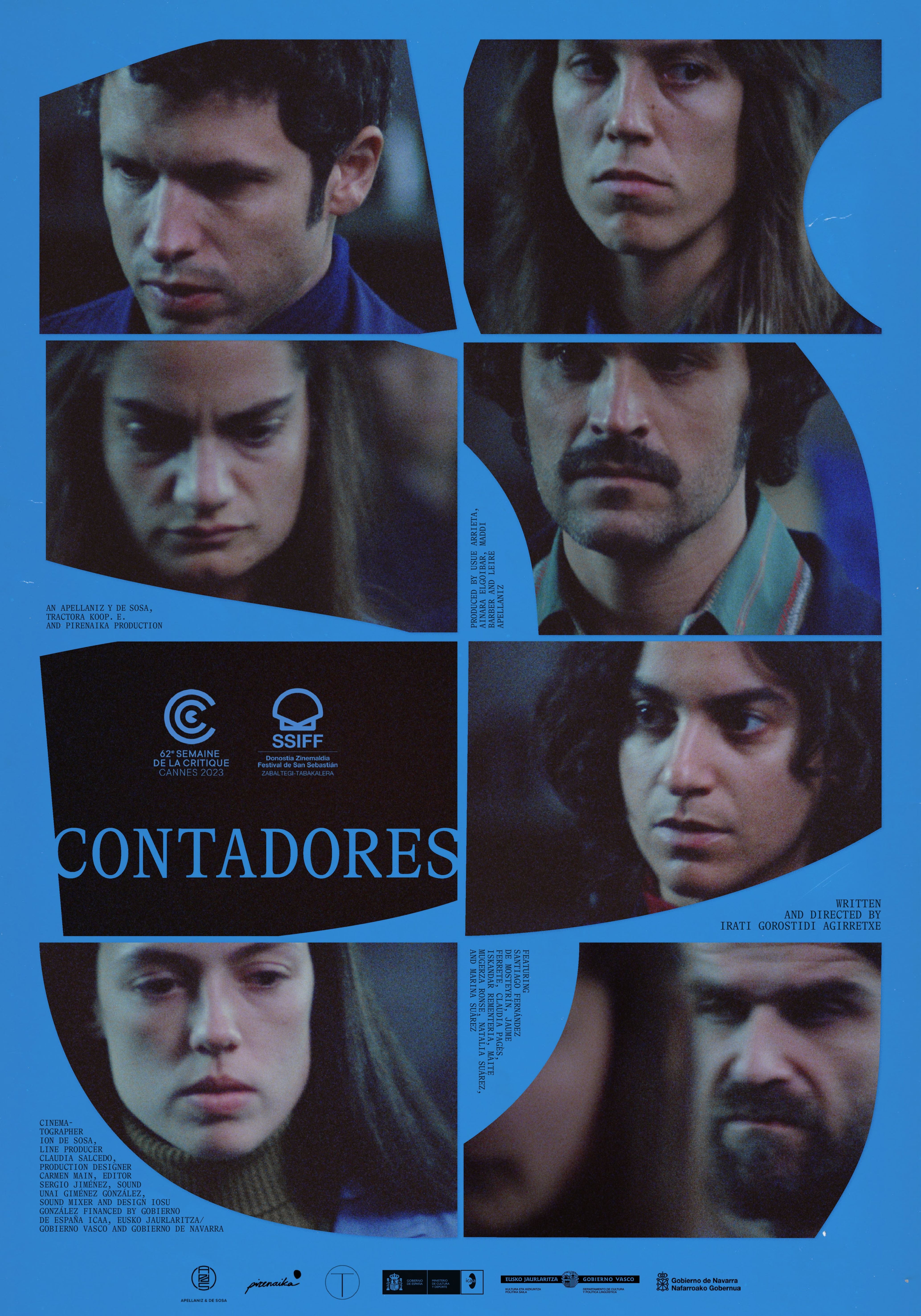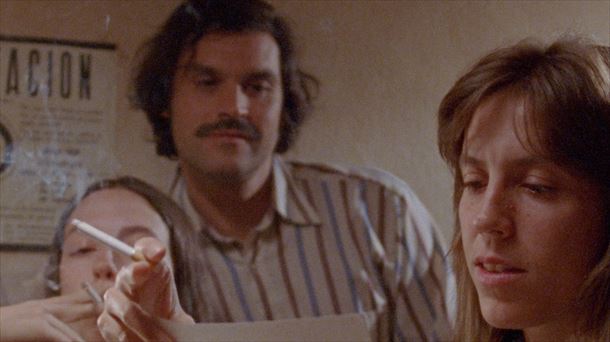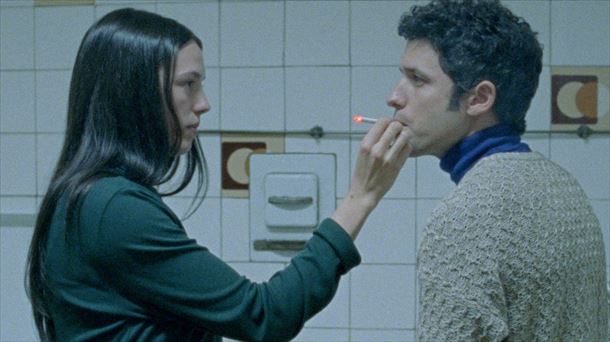Irati Gorostidi: “One of the purposes of ‘Contadores’ is to review or question prejudices”
Euskaraz irakurri: Irati Gorostidi: “Aurreiritziak auzitan jartzea edo berrikustea da ‘Contadores’en asmoetako bat”
Chosen for the Kimuak catalogue, screened at Cannes Critics’ Week and selected to compete in the Zabaltegi-Tabakalera section of the San Sebastián Festival. Accountantsa short film by Irati Gorostidi, has embarked on a path that seems unstoppable.
The filmmaker born in Egüés in 1988 has set the story in 1978, and looks at a group of working people eager to undertake new ways of life and organization just after the end of Franco’s regime.
Gorostidi shows, in a 19-minute story framed in the process of negotiating a collective agreement for the metal sector, the desires and disappointments of those who thought about other possible worlds. We have spoken with her.
What reception has it had so far? Accountants?
The path taken so far has opened many doors for the film, it has received great recognition. I’m looking forward to presenting the film at Zinemaldia, which I think is a fabulous context; more, if possible, among friends and close to the entire team. I’m very happy.
What does a milestone like showing your work at Zinemaldia mean for a local filmmaker?
What I’m most excited about is that the public here is going to have the opportunity to see the film; that is very important to me.
Furthermore, Zabaltegi has always been a section that I have followed with great interest. It will be beautiful to be able to show the film in San Sebastián.
There is no doubt that it is an important festival, and I imagine that going through it will make it easier for the film to reach many other places.
How have you experienced Zinemaldia so far, and how would you like to experience it this year?
Having it so close, the Zinemaldia has been a magnificent door to discovering cinema for me since I was little.
Therefore, it is especially exciting to participate with a film for the first time.
Repairing in the form of Accountantsthe format, colors and texture take us to the time in which the film is set: the industrial Basque Country of 1978. What reflection is behind that presentation?
Behind the form, there is not only an intention to make a realistic recreation of the time. He would say that realism has been a consequence of the process, and not the other way around.
I think the example of printing pamphlets illustrates well what that process has been. In the film, a group of workers prints a pamphlet in the apartment where they live. To do this, they will use a multicopier known as a “Vietnamese” (apparently, it received that name because the Viet Cong used it), very easy to manufacture, transport and hide; she was very suitable for use in hiding.
The truth is that using a Vietnamese in 1978 is not very realistic, it is quite anachronistic. It was used, above all, during the Franco regime, in the 1960s, early 1970s… In any case, it seemed interesting to use it in the film; Taking into account that the main demand of the workers is autonomy, I thought it was appropriate that they continue using that method with some nostalgia.
To record the sequence, we had to learn how it was used, reproduce the system and conduct an in-depth study of its uses. All of this helped us understand the historical moment in a way that would not have been possible with simple theoretical research.

‘Accountants’. © Gabriel Pericas
You have completely distanced yourself from the epic, in a time of overdose of emotional messages. What is the reason behind that stylistic and aesthetic decision?
I would say that this is another consequence of the process. My intention was to understand the conversations and other details of the time, in addition to, as a filmmaker, trying other ways of working.
For example, through the film I reflect on the collective: how collective conversations develop, what is the structure of the conversations that take place in assemblies…
While making the film, I did not think about the effect it would have (the emotional impact it would have, etc.), but rather I analyzed formal, aesthetic and theoretical issues using the tools that cinema offers me.
The film looks at those who promote more horizontal ways of management, beyond the chains that bind them (Francoism and post-Francoism or transition, in this case). How much is a tribute and how much is an incentive for the present or the future in the film?
Yes, there is, to some extent, a desire to pay homage, always with great concern to avoid nostalgia or idealization.
It seems too much to say that it is an incentive for the present or the future; That would be wonderful, of course!
Perhaps, more specifically, one of the purposes behind the film may be to question or review prejudices about what happened at that time.

‘Accountants’
There are and have been many proposals for a more horizontal organization or management. What was special about those that emerged in the Basque labor movement around 1978?
The truth is that I don’t know if the proposals of that time were special. Perhaps, I have paid more attention to the similarities they have with other processes than to their differences…
I would say that a very significant part of the narrative about the present in recent years has been done looking at that time or starting from it, and some elements from then, marginalized when it comes to explaining it, have caught my attention. I have focused on the case of the labor movement, but surely we would find incredible and significant things if we looked towards other areas.
Being a film that talks to a certain extent about labor relations, what has the process of making it been like?
In this type of project, it is very helpful to work with people with whom you have an affinity. Although each person on the team has their own role, it helps a lot if their point of view is aligned with that of the project and to work in a transversal way.
How do you see the current situation of Basque cinema?
I feel lucky because I work among people I admire; I feel that we are developing our practice in conversation with each other. That is wonderful, a gift that offers me immense pleasure, and I think that, if it weren’t for that, I wouldn’t be doing what I do.
Beyond that happy feeling, I can’t say much; I have not examined the current situation of Basque cinema, and it is difficult for me to answer these types of questions. Trying to avoid simple occurrences, something occurs to me that is obvious: in Euskal Herria there are financing possibilities, and, if it were not for that, it would not be possible to do what we do.
Surely, the main reason for the visibility and abundance of Basque cinema is simply material.

‘Accountants’
The short films Accountants and San Simon 62 (Irati Gorostidi and Mirari Echávarri) have emerged in the process of creating the feature film Anekumen. What can you tell us about him?
Anekumen It is a fiction set in the 1980s, and is based on my research about a community called Arco Iris.
The two short films you mentioned have the same origin. Right now, we are quite advanced in the development phase and we are still in the financing process for production.
If all goes well, we will shoot in summer 2024.
What do you wish for Accountants?
I wish you to find your way. Let’s see if it enables interesting conversations and hopefully, when I look back in a few years, I will feel that it has been important in a learning process.
Source: Eitb
Bruce is a talented author and journalist with a passion for entertainment . He currently works as a writer at the 247 News Agency, where he has established himself as a respected voice in the industry.












